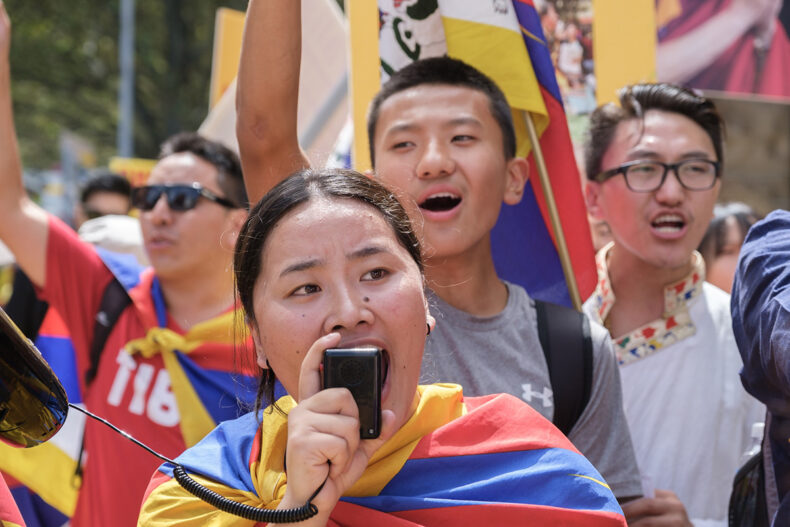While the leaders of China, particularly President Xi Jinping, seize every opportunity to flex their muscles and brag about their country’s strength and influence around the world, it is interesting to note that they are now helpless and desperate inside the confines of their own colonies.
There have been numerous reports of China using coercion and making frequent announcements about new laws and regulations to restrict religious activities among the local populations, whether it be in Tibet, East Turkistan (Xinjiang), or South Mongolia.
Despite more than seven decades of colonial repression and oppression, the people of Tibet have steadfastly refused to submit to Chinese rule. One of the many methods they use to express it is through their faith in Buddhism and the Dalai Lama.
In contrast, despite all their efforts, the Chinese authorities still seem to find the Uyghurs’ devotion to Islam and the Tibetans’ and Mongolians’ devotion to Buddhism to be a major source of irritation.
On the one hand, it is interpreted as a challenge to the atheistic communist leadership, and on the other hand, it stands for their resolve to uphold their unique national identity and refusal to be assimilated into the Chinese Han identity.
Both are seen as acts of resistance to communist rule and, as a result, as “splittist” activities, which are treated as the worst “crimes” against the Chinese state.
This anger and the desperation of Chinese rulers of these colonies reflected itself once again early this month on the 4th of August when authorities in Ngaba Tibetan Autonomous Prefecture of Sichuan province of China issued formal orders threatening Tibetans against posting any messages on social media related to the 80th birthday of 11th KyabjeKirti Rinpoche who happens to be the abbot of the Kirti monastery of Ngaba.
The Kirti is one of the most important and influential monasteries in original Tibet’s Ngaba and Dzoge regions. Kirti and Ngaba have been in the international news frequently in recent years because this region has seen the highest number of self-immolations by Tibetans protesting China’s colonial rule over Tibet. According to Tibet Press, the total number of known immolations in Tibet was over 154 as of last count.
A “Notice on the Boycott of Illegal Missionary Activities of Tibetan Buddhist Monks” was officially issued by the communist rulers of Yunfu and was directed at the foreign Tibetan monk visitors from Tibet and other nations.
The CPC’s obsession with Gyaltsen Norbu, whom it has been presenting to the Tibetan people and the rest of the world as the “real” 11th incarnation of the Panchen Lama, is now the manifestation of Xi’s new campaign. The 10th Panchen Lama had initially proved to be a useful tool in the hands of Beijing when the Dalai Lama escaped to India and the Chinese used him to placate the Tibetan people’s anger.
The 10th Panchen Lama was later rehabilitated after spending over a decade in jail and labour camps, but he died under mysterious circumstances in Tibet in 1989 after criticising Beijing rulers for their misdeeds in Tibet. See here.
In mid-June of this year, the Chinese media advertised Norbu as presiding over a Buddhist symposium hosted by the Tibetan branch of the Buddhist Association and aimed at “promoting the Sinicization of Tibetan Buddhism.”
Norbu was picked up by CPC out of nowhere in 1995 as the ‘real’ Panchen Lama when he was only five years old.
The CPC’s sudden decision came after the Dalai Lama recognised another boy, 6-year-old Gedhun Choekyi Nyima, as the new ‘incarnation’ of the 10th Panchen Lama, after some Tibetan members of the China-appointed search team leaked details about their findings to the Dalai Lama in exile. See here.
The Chinese police quickly removed Gedhun and his parents, and the CPC installed Norbu as the ‘real’ Panchen Lama. The world has yet to learn what happened to Gedhun and his parents 27 years after their kidnapping.
However, in its desperate attempt to subdue the Tibetan masses, the Beijing government has proclaimed Norbu to be the “supreme” religious leader of Buddhism in international forums as well as at numerous Buddhist events in China and Tibet. However, the trick did not work. Rather, inside Tibet, local Chinese administrators, including the police, must use their powers to force local Tibetans to attend Norbu’s congregations.













